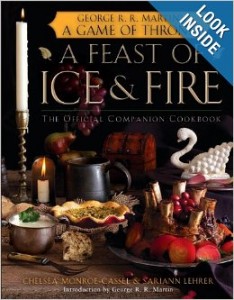 I stumbled across the Inn at the Crossroads food blog over the weekend. This is not just any food blog, oh no. This blog is dedicated solely cuisines of George R.R. Martin’s Game of Thrones world! The owners of this site have done an excellent job researching the food of the Middle Ages and those featured in the series. So much so, they were rewarded with creating the official Game of Thrones cookbook. Now, how awesome is that I ask?
I stumbled across the Inn at the Crossroads food blog over the weekend. This is not just any food blog, oh no. This blog is dedicated solely cuisines of George R.R. Martin’s Game of Thrones world! The owners of this site have done an excellent job researching the food of the Middle Ages and those featured in the series. So much so, they were rewarded with creating the official Game of Thrones cookbook. Now, how awesome is that I ask?
Needless to say, I’ve been exploring GRRM’s world via it’s cuisine for the past fews days. Let me say, some of the entries looks excellent, while some…..well…. (Jellied Calves’ Brains anyone??)
All of my exploration lead to an epiphany. And no, it’s not that I’m a geeky nerd that can’t wait til season 4 in a few months. 🙂 It was about the importance of using setting and the five sense in your writing and how they can work to create lasting impressions with your readers. One of the tools GRRM uses in his Game of Thrones series is setting the scene and atmosphere via description & this includes food, it’s almost a character unto itself. For example:
[readolog_blockquote ]“She broke her fast on sardines, fried crisp in pepper oil and served so hot they burned her fingers. She mopped up the leftover oil with a chunk of bread torn off the end of Umma’s morning loaf and washed it all down with a cup of watered wine, savoring the tastes and the smells, the rough feel of the crust beneath her fingers, the slickness of the oil, the sting of the hot pepper when it got into the half-healed scrape on the back of the hand. Hear, smell, taste, feel, she reminded herself. There are many ways to know the world for those who cannot see.” -A Dance with Dragons [/readolog_blockquote]
See how GRRM uses food organically to add flavor to the scene? Can’t you almost see, smell, feel, and taste that? See how he tied that to the character? Even if you’re not familiar with this series, or this character, you’ve gotten to know her by reading this. And experiencing her half healed scrape this way was more engrossing than him just telling us about it. (a classic example of show vs. tell here).
And even if you don’t go into this much detail about a dish, a drink, or even a flowery meadow, just the mention of certain items can evoke the senses. Using “bacon and eggs” vs. “breakfast”, or “steaming mug of chai” vs. “cup of tea”, or “the lone pink rose” vs. “the single flower” evoke the five senses in a way that allows the reader to sink into the book and experience the words on the page, as well as read them.
It’s been said that the sense of smell has the strongest tie with memories. Use this to your advantage. Every reader is different, with a different set of experiences and feelings tied to certain objects and smells. The smell of roses may remind some of the bouquet their significant other sent them as a gift, while for others it may recall the pain of losing a loved one.
As an author, you have no way of knowing what all these connections are. But it’s a good idea to select specific nouns and adjectives to evoke visceral responses from your readers. Arousing their memories is a great way to help them personalize your story which, hopefully, will pull them deeper into it.
I used smell to layer in setting in the opening of Found Rhythm
[readolog_blockquote ]”Isa hurried through the hallowed halls of hell, otherwise known as Hill View High School. She rounded the corner and was met with a renegade blast of the late southern summer that whipped through a propped open door. Her nose wrinkled in protest since it carried with it the aroma of sweaty teens, cheap perfume, and industrial cleaner.” [/readolog_blockquote]
While I am no where near as masterful as GRRM, a reader did mention my use of the five senses in a positive review of my story. ![]()
GRRM’s writing invoked a visceral response with the creators of the food blog, allowing their passion to put them in position to not only author an official companion piece for the Game of Thrones series, but also help fans immerse themselves in one of their favorite fantasy series.
What author doesn’t want that type of response to their work?
So when writing your masterful works of fiction, allow your characters–and thereby your readers– to experience and explore their environment–whether is the “real world” or a fantastical one– organically through their five senses.
Of course, I HAVE to get this cookbook now. Who knows, I may host a dinner party for the Season 4 premier. Sansa salad, honeyed chicken, black beer bread, lemon cakes, & Widling cider any one?


